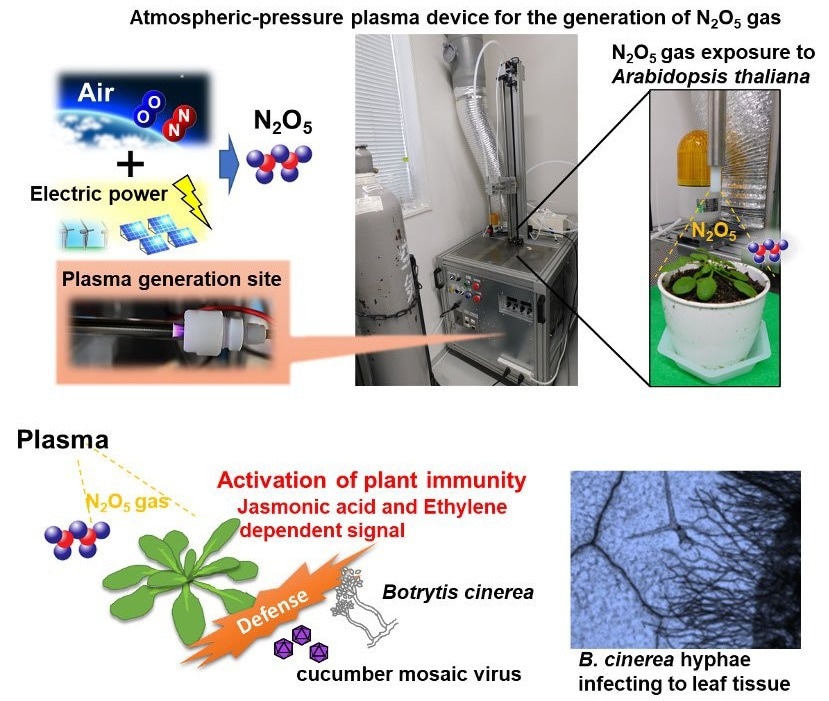The flash of lightning and the movement of the aurora contain the plasma, the fourth state of matter that scientists have exploited to create a gas that may trigger plant immunity against widespread illnesses.
 Scientists from Tohoku University harnessed plasma to produce a gas that helps plant fight against widespread diseases. Image Credit: ©Tohoku University
Scientists from Tohoku University harnessed plasma to produce a gas that helps plant fight against widespread diseases. Image Credit: ©Tohoku University
The team from Tohoku University in Japan published their findings in PLOS One on June 24th, 2022.
Currently, chemical pesticides are the mainstay of disease control in agriculture, but they can contaminate the soil and harm the ecosystem. We need to develop plant disease control technologies that can help establish a sustainable agricultural system. The use of plant immunity is one of the most effective disease control methods because it utilizes the innate resistance of plants and has a low environmental impact.”
Sugihiro Ando, Study Author and Associate Professor, Graduate School of Agricultural Science, Tohoku University
The researchers created dinitrogen pentoxide, a reactive nitrogen species (RNS), using a previously designed apparatus that generates plasma from the air. This chemical is similar to reactive oxygen species (ROS) in that they both cause cell damage and activate unique stress responses in organisms.
“It is well known that reactive species are important signaling factors in the immune response of plants, but the specific physiological function of dinitrogen pentoxide is poorly understood. Plants produce reactive species as a defense response when they perceive an infectious stimulus from a pathogen. The generated reactive species function as signaling molecules that contribute to the activation of plant immunity,” Ando said.
Reactive species, according to Ando, are connected to plant hormones like salicylic acid, jasmonic acid, and ethylene, which help control plant immunity, but the physiological function of dinitrogen pentoxide remains unknown.
“Since reactive species are known to have important functions in plant immunity, we analyzed weather exposure of plants to dinitrogen pentoxide gas could enhance disease resistance,” Ando said.
For three days, the scientists subjected thale cress, a small plant often used as a model system for science investigation, to dinitrogen pentoxide gas for 20 seconds per day. After that, the plants were attacked with one of three common plant pathogens: fungus, bacterium, or virus. Plants infected with the fungus or virus had slower pathogen growth, whereas plants infected with the bacterium had the same rate of proliferation as control plants.
These results suggest that the dinitrogen pentoxide gas exposure could control plant disease depending on the type of pathogen.”
Sugihiro Ando, Study Author and Associate Professor, Graduate School of Agricultural Science, Tohoku University
A genetic investigation found that the gas selectively stimulated the jasmonic acid and ethylene signaling pathways, resulting in the manufacture of antimicrobial compounds, which Ando believes may have contributed to the reported disease resistance.
“Dinitrogen pentoxide gas can be used to activate plant immunity and control plant diseases. Through plasma technology, gas can be produced from air and electricity, without special materials. The gas can also be converted to nitric acid, when dissolved in water, and used as a fertilizer for plants. This technology can contribute to the construction of a sustainable agricultural system as a clean technology with minimal environmental impact,” Ando said.
The scientists intend to investigate how their technology works with crops and greenhouse cultivation next.
Source:
Journal reference:
Tsukidate, D., et al. (2022) Activation of plant immunity by exposure to dinitrogen pentoxide gas generated from the air using plasma technology. PLOS One. doi.org/10.1371/journal.pone.0269863.